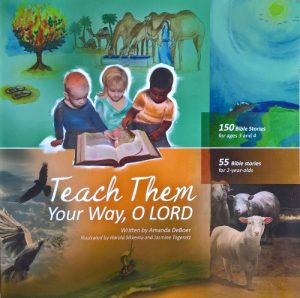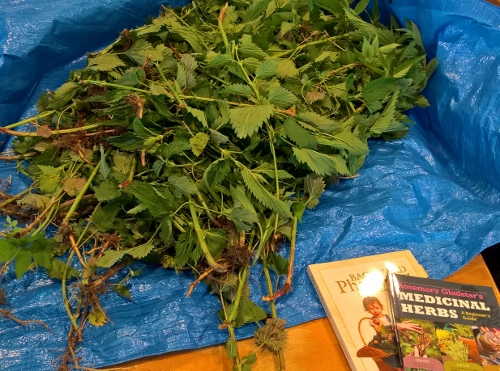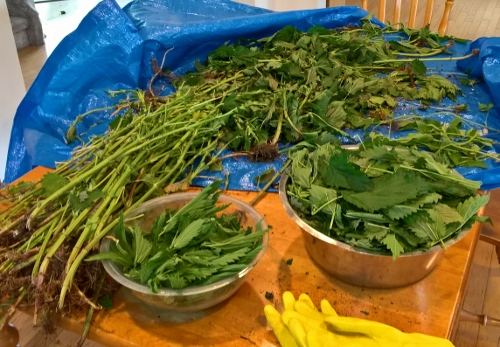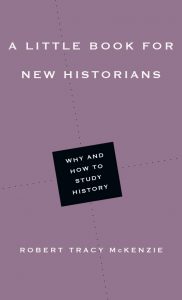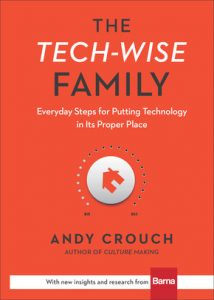
We are surrounded, overwhelmed, and almost defined by our technology. Andy Crouch tries to come to grips with this phenomenon in The Tech-Wise Family, looking at statistics, biblical principles, and personal experience to arrive at ten Everyday Steps for Putting Technology in Its Proper Place.
Just as fish do not understand water, so we do not comprehend the all-encompassing effect of the technology that has silently taken over our world. It is one of the greatest changes mankind has ever had to deal with, and we are not dealing with it well.
In fact, Crouch writes that ‘the pace of technological change has surpassed anyone’s capacity to develop enough wisdom to handle it.’ Thus, even in our current culture, ‘families have few more pressing needs than for guidance about how to handle the devices that have colonized our homes and our attention.’
In other words, we need to do more than merely have internet filters and screen limits; we need to realize that we are being enslaved unwittingly. We desperately need to consider what it means to love the Lord our God with our whole hearts, minds, souls, and strength, and to love our neighbor as ourselves now, in our tech-saturated culture. Once we begin to understand that, we need to work toward it faithfully in ourselves, our families, and our churches.
Thus Crouch points out that we Christians need to think about what technology’s proper place in our lives should be, and then to ensure that we put it there, in its proper place, and keep it there. This is countercultural—radical, even—and difficult, but probably more necessary than we can imagine.
Technology is in its proper place, writes Crouch, when
- it encourages connection ‘with the real people we have been given to love’, not with people we will never meet.
- it encourages conversation, not when it inhibits talking and listening.
- it helps us care for our bodies, not when it promises escape from our physical limits.
- it assists us in developing skills in all aspects of culture, not when we consume it passively.
- it helps us see creation with awe and responsibility, not when it keeps us from engaging with it in real life.
- we use it purposefully, not when we let it overrun our lives.
This wise list is a good start to thinking biblically about tech. Now, how do we ensure these things happen?
In The Tech-Wise Family, Crouch addresses this question to help us reduce the hold technology has over us and to return to a more biblical, God-centered way of living. First, he presents insights and research from Barna Group. Then he discusses a set of nudges, disciplines, and choices that will help us focus on ‘the hard and beautiful work of becoming wise and courageous people together’ which, with explanation, is what he claims family is really about. Even though there may be some quibbles with that statement, it is valid in many respects. Or, in different terms, he states that we need to be able to focus on our core callings and commitments without distractions. To this end, he argues for ten far-ranging commitments we should make regarding our families’ use of technology.
According to Crouch, we need to make three key commitments that will have tremendous impact on every aspect of our families’ lives. We need to decide
- to strive for the wisdom to guide our actions biblically and the courage to act upon this wisdom. We are not called to make our children’s lives easier but better.
- to set up our physical homes to encourage creativity, relationship building, and engagement.
- to structure our time biblically, in terms of fruitful work and fruitful rest, not fruitless toil and fruitless leisure. Crouch points out that Sabbath keeping, like honoring our parents, is a commandment based on what we would have been required to do even without the fall into sin.
In terms of daily life, we need to consider
- waking and sleeping—so that our last and first thoughts are not dependent on our phones. We were created to need rest and we should ensure that we get both sleep and down time, with our phones away from our bedrooms.
- learning and working—so that our children will have time to grow up in the real world instead of in a virtual one. We are human, bodies and souls, and we need to live as God created us to, with our bodies as well as our minds.
- the good news about boredom—so that dependence on technology will not ‘undermine our ability to enjoy and notice the abundance of the ordinary’. Boredom is an important warning sign that our capacity for fruitful work and rest have been seriously depleted, and the solution is not more screen time but less of it. Families should use screens together, for a specific, creative purpose.
- car time—so that we use these valuable hours for conversation. If, as some suggest, most conversations take about seven minutes to really begin, then the extended screen-free time we can enforce in our cars is a beautiful opportunity.
- total access to our children’s devices and passwords for our spouse’s devices—so that we will be less likely to give in to sexual temptation online. Even though determined teens can get around any safety features we provide (and phones are inherently unsafe), it is important that they know there are boundaries and that they have our guidance. As for spouses, the goal is not surveillance but to keep so connected with each other that sin will be less attractive and, if it happens, less damaging to our souls and relationships.
Finally, Crouch points to two things that matter most in our families:
- Singing together instead of relying on recorded or performed music in our lives and worship, because ‘the most important thing we can learn to do is worship’ and we are commanded to learn this in families. (Deut 6:4-9)
- Showing up in each other’s lives in person, because this shows us the frailty and limitations of our bodies which technology, medical as well as distractive, tries to deny. We are human; we are born, we grow, and we die; and we are meant to do so together, spurring each other along ‘on the way to a better life, the life that really is life.’
Crouch addresses each of these points thoughtfully, often with surprising clarity and insight, and helps us understand how to live wisely with technology in our families. In each case, he provides a reality check, where he shares how the commitments have worked out in his family. He openly admits that it is not easy, sharing both struggles and successes, and celebrating partial wins. I agree that it is not easy; our family, too, has a long way to go.
The Tech-Wise Family should be read by all Christian parents, probably by all Christians who own a cell phone. But will it be widely read? Most likely not. Ironically, many of us are too distracted to read and think deeply. Furthermore, we are too afraid of being convinced and then needing to change our lifestyle. Finally, each of us is certain that, ‘I can handle this.’ (But wait, isn’t that what all addicts say?)
That begs the question: Are we addicted to technology? If so, we need to repent and reengage with God, each other, and the world. Is technology distracting us from our primary calling and commitments? If so, we need to put it in its proper place. And since all addiction, including that to tech and porn, feeds on emptiness, it becomes even more important to follow Crouch’s suggestions to increase relationships, meaning, and satisfaction. We need to experience for ourselves what Crouch’s daughter wrote, that ‘technology promises wonder, but the world out there is better than anything technology can offer.’
The Tech-Wise Family is a helpful guide to living as Christians in an increasingly distracted world. In the Parable of the Sower, Jesus warned us against being so distracted by the things of this world that his Word in us would be unfruitful. This is serious stuff, and we parents should carefully consider the things Andy Crouch says, both for our families and ourselves. This book is not primarily an anti-tech rant (actually Crouch loves tech, too, and uses it constantly); it is about our very salvation.
So let us be wise, learning what we need to learn and applying it diligently. Let us remember that no one can have two masters. When he said that, Jesus was referring to being enslaved by money, but tech has an equally strong hold on many. If tech is our master, we are in danger; if tech is our servant, we can use it to God’s glory.
May God bless us all as we bravely navigate this new world that we are only beginning to realize we have entered.
—
Related articles I have written:
Review of Captivated: Finding Freedom in a Media-Captive Culture, a Christian documentary that addresses similar issues.
“Glow Kids, Screens, and Education.” It turns out that screens may cause more educational problems than we suspected.
“Screens and our Kids’ Mental Health, with Tips for Parents.”
Review of Glow Kids: How Screen Addiction is Hijacking our Kids—and How to Break the Trance by Nicholas Kardaras.
Review of 52 Ways to Connect with your Smartphone Obsessed Kid by Jonathan McKee. Practical ways to connect or reconnect.
Review of Growing Up Social: Raising Relational Kids in a Screen-Driven World by Gary Chapman and Arlene Pellicane. “Is it possible for children to learn about relationships and responsibilities when the vast majority of their time is spent absorbed in a screen?”
If you enjoyed this review, you might want to connect with me on GoodReads where I eventually share what I read, or friend me on Facebook where I occasionally show up.
Disclosure: This book has been provided courtesy of Baker Publishing Group and Graf-Martin Communications, Inc. and is available at your favorite bookseller from Baker Books, a division of Baker Publishing Group.
This may be linked to Saturday Reviews, Booknificent Thursdays, 52 Books in 52 Weeks Challenge, Literacy Musings Monday, and The Book Nook as well as to Inspire Me Monday, Christian Homemakers, Friendship Friday.



